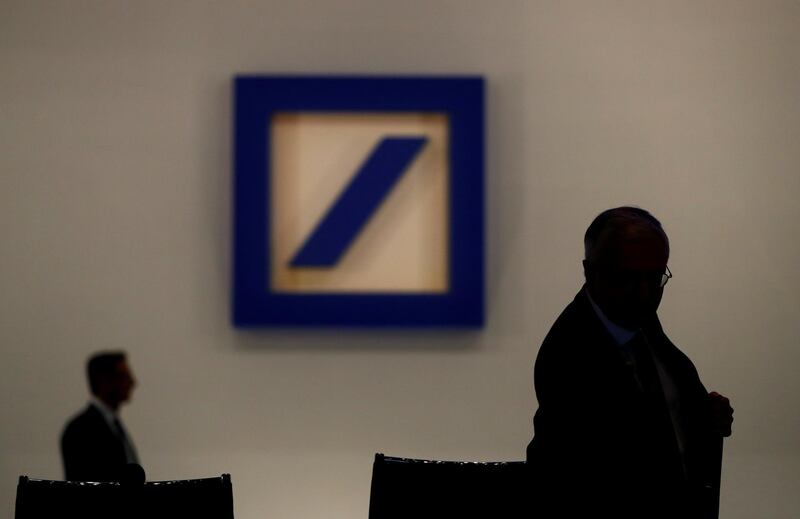Deutsche Bank AG chairman Paul Achleitner is on his third strategic overhaul and fourth chief executive officer. Now, he’s mulling a solution that’s been raised countless times: merging Germany’s weakened banks to create one that thrives.
Achleitner has spoken with top shareholders and key government officials about potentially combining Deutsche Bank with Commerzbank AG, according to people familiar with the matter. Such pairings have been floated -- and sometimes pushed through -- over the past decade as Germany has struggled to sustain a financial titan to match its massive economy. The concept’s re-emergence now shows pressure is building on Achleitner to snap Deutsche Bank out what it calls a “vicious circle.”
Such a plan might even work if the banks are able to combine retail businesses, decrease headcount and sell off some global operations, including trading infrastructure, said Roy Smith, emeritus professor of management practice at New York University’s Stern School of Business. Still, he sees that as a long shot.
“It’s like tying two drunks together to give them more stability,” Mr Smith said in an interview.
Deutsche Bank fell 0.9 per cent at 9:03 a.m. in Frankfurt trading. The shares hit a record low last week and are down 40 per cent this year to give the company a market capitalisation of 19.7 billion euros ($23.2 billion). Commerzbank declined 1 per cent, bringing losses in 2018 to 25per centt and valuing the lender at 11.7 billion euros.
Just this week, Deutsche Bank Chief Financial Officer James von Moltke described to investors the feedback loop that’s bedeviled his firm: Multiple turnaround plans in recent years have failed to deliver revenue that justifies expenses, prompting downgrades to credit ratings and rising funding costs. A strategic overhaul announced in April -- paring businesses to improve profitability -- should eventually turn things around, creating a “virtuous circle,” he said.
In comparison, a merger would be much bolder. While there are currently no formal discussions between the two Frankfurt-based lenders, and no combination is imminent, Achleitner has been talking with stakeholders about a possible deal down the road, the people said.
A key obstacle is Deutsche Bank’s depressed share price, with investors telling Achleitner that they don’t want a merger with Commerzbank at the moment because it would be highly dilutive and potentially trigger a capital increase and hefty writedowns, the people said. The two banks held talks in the summer of 2016, but decided then against a deal while they focused on restructuring their own businesses, a person with knowledge of the matter said at the time.
Deutsche Bank has struggled to maintain the confidence of investors amid a tumultuous management reshuffle and a plan to significantly reduce its global footprint and workforce under new chief executive Christian Sewing. Last week, S&P Global Ratings cut it to the third-lowest investment grade.
_________
Read more:
[ S&P cuts Deutsche Bank rating in latest blow for Sewing’s revamp ]
[ Deutsche Bank to slash at least 7,000 Jobs to cut cost and boost profit ]
[ Deutsche Bank to focus on Europe in sweeping overhaul of its investment bank ]
_________
Commerzbank’s shares have been sliding as the bank tries to avoid a third straight year of declining revenue amid low interest rates and increasing competition weighing on the retail and corporate lending businesses that chief executive Martin Zielke has earmarked for growth. It tried to beef up during the 2008 financial crisis by buying German rival Dresdner Bank AG.
While some people familiar with Deutsche Bank’s talks said Achleitner floated the idea, another said the question has come from investors. A Deutsche Bank spokesman declined to comment. The German finance ministry and economy ministry could not immediately be reached for comment.
A merger would “lead to tremendous cost cutting as both banks have significant exposure to Germany,” Natixis analyst Alex Koagne wrote in a note. “But we indeed think that such a move is not possible at this stage as both banks still need to clean their balance sheet first. Going forward, we view this deal one of the only ways to save Deutsche Bank.”
Speculation about a merger of the two German lenders -- or of one of them with an international competitor -- has increased in the past year after private-equity firm Cerberus Capital took a stake in both banks.
While a deal would potentially create massive synergies because the two could dramatically cut retail outlets in their German home market, the ensuing job reductions would likely meet resistance from labour unions which exert considerable influence on the boards of both companies.
The German government would also play a major role in any deal, given it’s the largest shareholder in Commerzbank, with a stake of more than 15 per cent. The government has repeatedly said the country needs a strong international bank, with Finance Minister Olaf Scholz reiterating that message as recently as April.
Deutsche Bank will probably report another quarter of declining revenue for the three months through June as it scales back investment-banking operations and cuts thousands of jobs.
The lender will probably do “a little worse” than peers who have indicated they expect a flat top line, “given the quarter that we’ve had and the transition that we’ve been through,” the CFO said Wednesday.
A decline in the second quarter would be the sixth consecutive quarterly drop in revenue. Deutsche Bank has said it expects “essentially flat” revenue for the full year.






